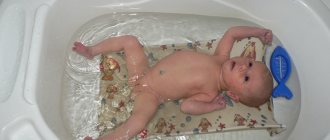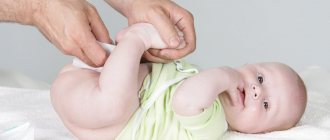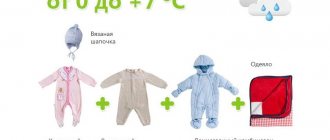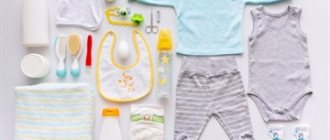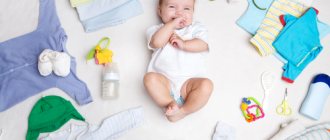What do you need at home after leaving the hospital?
The main requirement for a home is, of course, cleanliness. But this does not mean that the expectant mother, a few days before giving birth, should run around with a rag and wash every corner. On the contrary, doing this is strictly prohibited. In such a matter, you need to ask your husband for help, and best of all, your future grandmother or even two. Order needs to be restored when the woman in labor is in the maternity hospital, a couple of days before discharge.
The second necessary action is to prepare the children's room or, if this is not possible, a special place in the room. The room should be bright, spacious, and well ventilated. In addition, it is also necessary:
- Purchase a night light in advance, because... I have to get up more than once at night to feed the baby.
- Children's clothes should be kept separate from adults', so a chest of drawers for children's things will come in handy.
- Get a crib. The choice of cribs is very large: the variety of designs, colors and shapes is simply amazing. Which crib is best for your child is up to you to decide. The main thing is that the crib is a comfortable place for the child to sleep and spend time. Along with the crib, you need to choose a mattress. It’s not worth saving on buying a mattress, since the quality of the mattress will determine the health of your little one.
If the air in your home is dry (due to the heating season or for other reasons), it is best to purchase a special humidifier. Dry air has a negative effect on the baby; the nasal mucosa begins to dry out and a runny nose begins, which can easily develop into a chronic one. Therefore, you should not forget to monitor the air humidity in the room. You can, of course, try to do without a special humidifier. To do this you need:
- do wet cleaning every day
- ventilate the room more often
- you can place a large container of water near the battery or hang wet things in the room and on the battery
However, as practice shows, such methods are ineffective and short-lived.
The first days of a newborn at home: it’s really not very scary
Many different traditions and rituals have always been associated with discharge from the maternity hospital and the return of mother and baby home. But if some of them, such as a small photo session for young parents with a sniffling bundle in their arms or congratulations from friends and relatives on the threshold of the maternity hospital, are quite pleasant (if they do not drag on for too long), then others can become a real test for the mother. Many families have a tradition of celebrating the birth of a baby on the day of discharge from the hospital. And it would be nice if only the grandparents came to see their grandson. But often all the numerous relatives gather for a feast. In this situation, one can only sympathize with the young mother. The days spent in the maternity hospital become a real test for most women: fatigue after childbirth, physical and emotional stress, complete confusion in thoughts and feelings, unusual surroundings, the need to adapt to the fact that there is a little person nearby who requires constant attention around the clock... Young Mom so wants to get back to her native walls as soon as possible, so that she can finally feel the comfort of home, calmly take a shower and be alone with her beloved husband and tiny baby... But, if the grandparents decide to organize a festive feast, mom will have to go through another difficult and tiring day. She will have to be torn between the guests, the baby, her husband and the desire to just lie down and relax. But then you still have to clean the house and wash the dishes... What kind of holiday is this and who is it for, if the hero of the occasion wants only one thing: for everyone to leave as quickly as possible?
The first days of a newborn at home are the period of adaptation of the baby to new living conditions. But this is also the time when the mother gets used to the new quality. And it would be better to delay visiting friends and relatives a little. This will protect the mother from unnecessary worries and tension, and the baby from excessive stress on the nervous system and infections.
It will be better if you say goodbye to your relatives and friends at the door of the maternity hospital, and go home only with your family.
Let peace and quiet reign in the house on the first day after discharge. A young mother should put herself in order, relax, calm down. Then she will have to try out the crib and changing table for the first time, choose the most convenient place for feeding, and bathe the baby herself for the first time. And she will be most comfortable only alone with her closest people.
Newborn at home: turning on intuition
Parents are not born! As you grow and raise your child, you will repeat this well-known truth to yourself over and over again. Especially in the very first days at home with the baby. No matter how hard you try to maintain your usual way of life, you will not succeed. A small child makes serious adjustments to it. And it takes time to get used to it. The baby requires constant, round-the-clock attention and care. Now mom no longer belongs to herself! In the first days at home, even such mundane procedures as changing clothes, bathing, treating the umbilical wound, feeding, can cause some panic in a young mother. Especially if the baby was not with her in the maternity hospital, but in the children's department. On the one hand, in the first days after giving birth, the mother wants to rest at least a little and come to her senses.
But it’s still better to immediately be in the ward with the newborn baby. Then, within a few days of staying in the maternity hospital, the mother will have time to get to know and get used to her baby a little.
Qualified medical personnel are always nearby to help, advise, advise and teach. And then, when she gets home with the baby, the mother will no longer be afraid to pick him up, wash him, wipe the folds with a napkin, put on a diaper or change her blouse. The transition period will be easier and more painless for her and the baby.
If the mother met the baby only during feedings, finding herself at home alone with a fragile crying lump, she may well be confused. And here it would be nice to seek the help of an experienced grandmother or one of your relatives or friends. Caring for a baby is not difficult when you know what and how to do.
A young mother only needs to change clothes and bathe her baby once or twice with an experienced person to feel more confident.
You can, while still in the maternity hospital, ask the nurse in the children's department to tell and show you the main points of child care that will be needed from the first day after discharge. Fortunately, the modern young mother no longer needs to master the difficult science of swaddling, since there are a variety of clothes for babies from the first days of life, but even putting on a disposable diaper correctly, if you have never done this before, is also not easy!
Usually on the second day after discharge from the maternity hospital, a visiting nurse from the children's clinic comes home.
Some schools for expectant mothers have a service to call a specialist at home, which you can also use if necessary. Surely, by then you will already have a lot of questions. Don't be shy about asking the nurse, even if they seem stupid to you. It's better to ask a "stupid" question than to do something wrong or doubt your actions. Each of us once learned all this, mastering the difficult science of being a mother.
Try to focus on the baby, spend as much time as possible with him, care for him, communicate, observe, listen to him and your own feelings. Now it is important for you to establish an invisible connection with the baby, which will help you better understand his desires and needs, awaken that very maternal intuition, which will always be the best hint for you in all difficult situations.
It will be very helpful if the husband takes a vacation. At least for a few days. This way he can help you get used to your new role in the very first and most difficult days after giving birth.
Newborn at home: things can wait
It is important for a new mother to get as much rest as possible. Especially if the birth was difficult or the baby was born by caesarean section. Remember that the calmer a woman is, the more opportunities she finds for relaxation, the easier it will be for her to cope with all the worries about the baby and establish normal breastfeeding, which largely depends on the psychological state of the mother.
In the first days after returning home from the maternity hospital (and perhaps even in the first months, while the baby is still very small and requires your undivided attention), all household chores: cooking, washing, cleaning and other household chores recede into the background.
The most important thing for you right now is to recover from childbirth. After all, the baby needs a calm, caring mother, not tormented by her own torment that she is a bad housewife.
If grandmothers or other loved ones offer you their help, do not refuse it. At least in the first days after returning from the hospital. Let your relatives clean up the house, go grocery shopping, iron the children's things, or prepare dinner... Any help around the house will be very useful to you now. Because it will give you the opportunity to devote yourself to your child without remorse. And, of course, to yourself. You deserve it!
Newborn at home: only peace of mind!
It often happens that in the first days after discharge from the maternity hospital, quarrels break out in the family every now and then. Well, it would seem, what could interfere with peace and tranquility? The difficult months of pregnancy are behind us, as are childbirth and the worries associated with it. In general, live and be happy!
But young parents have to face many unusual and difficult situations to which they have not yet been able to adapt. Mom has to completely rebuild her lifestyle. There is now much less time left for usual household chores, and you need to learn to cope with it all. Of course, it’s very difficult for her. But the young dad gets it too! After all, he is also accustomed to a certain rhythm of life. And this rhythm has now changed dramatically: the level of responsibility has increased, there is almost no time left for oneself personally, all the minutes free from work are spent helping the wife and caring for the baby, the number of household responsibilities has increased, regular lack of sleep is taking its toll... And then there are the hormones of the young mother. the fire is being added! Naturally, all this can lead to irritability and excessive touchiness of both mom and dad. In such a situation, it is important for young parents to treat each other with understanding, love, respect, take care of each other, show care, find moments to just be together, talk about how the day went. You shouldn’t take everything to heart and overreact to possible misunderstandings.
It is important to understand: this happens to many people! And together you will definitely cope with this!
In the first days, a young mother will often have thoughts that she is doing something wrong, that she doesn’t know something, doesn’t understand something, can’t do it, can’t cope... Know: you are not alone in these doubts! The feeling of confusion is probably familiar to every young mother who is raising her first child. And with subsequent children it occurs periodically, because all children are different, and the situations are different, and every time something will be new. Try not to worry about trifles. You will definitely succeed! You will learn everything, become experienced and knowledgeable! And later you can easily give wise advice to inexperienced friends. In any situation, repeat to yourself that you are a wonderful mother for your little one. The kindest, loving, gentle, caring. Most most…
Fathers are not born...
- It may seem strange, but many young dads really need help to feel like fathers. After all, not all men immediately awaken paternal feelings for a newborn baby, unlike women whom nature has endowed with maternal instinct.
- In addition, dads are often afraid to do something wrong and harm the baby with wrong actions or movements.
- To overcome these fears, it is very important from the very beginning to accustom the husband to communicate with the new family member and involve him in caring for the baby.
What does a newborn need after discharge from the hospital?
The list of necessary things for newborns can be very large and endless, but you can get by with a very modest list, which will include only the most necessary things.
One way or another, the baby cannot do without the following things:
- A first aid kit, which must include brilliant green, hydrogen peroxide, potassium permanganate, sterile cotton wool, an anti-colic remedy (for example, espumizan, bobotik, plantex, etc.). The first aid kit can also be supplemented with a children's thermometer, an antipyretic for newborns, and a pipette.
- Baby skin care products. Modern industry offers a large selection of various creams, shampoos, powders, etc. The choice of products depends on the preferences of the parents, as well as the baby’s skin. Be sure to get diaper cream or powder and bathing product. However, you need to remember that you need to use the bathing product no more than 2 times a week. The rest of the time you need to bathe the baby in plain water, to which an infusion of chamomile or calendula has been added.
- Cotton pads, cotton swabs, wet wipes.
- Diapers (disposable or reusable, depending on the parents' choice).
- Diapers. Even if you are not going to swaddle your baby, diapers will always come in handy. There should be both warm diapers and regular ones. There is always a pressing question about the number of diapers. The minimum set is 4 warm and 5-7 regular. You just need to remember one rule: the fewer diapers you have, the more often you will need to wash them.
- A blanket for the crib and another for the stroller.
- Minimum 2 sets of children's bedding. Now you can also buy crib bumpers and canopies. However, in the first month of a baby’s life, the sides in the crib are not particularly necessary; on the contrary, they can only get in the way, covering the baby from the mother.
- The canopy is also a controversial item; it plays more of a decorative role, while at the same time collecting dust. Therefore, if a child suffers from allergies, it is better to refuse the canopy.
- Bath for bathing. Recently, you can come across the opinion that you can bathe in a regular bath, but in the first months a special bath will be more comfortable and safer for the child.
- Towel, nail scissors for baby.
- Stroller, child car seat.
- If the child is bottle-fed, you must also purchase 2 feeding bottles.
- Clothes for the baby. It is best to buy clothes that can be unbuttoned. Such clothes allow you to change your child's clothes most comfortably.
These are the main things you will need in the first days of your baby's life. Of course, the list can be expanded. It all depends on the wishes and wallet of the parents.
A rocking chair, a pacifier, a special slide for swimming, a water thermometer, etc. will be very useful. At about a month you can already buy bright toys and rattles. The main thing is not to panic and not to sweep away everything necessary and unnecessary from the shelves of children's stores. If you haven’t purchased something yet, you can always do it in the process.
Feeding a newborn
A woman receives basic knowledge about the nutrition of a newborn during pregnancy in classes for expectant mothers and in the maternity hospital. After returning home, unfortunately, complications arise - the breasts may become inflamed and the nipples may crack, causing pain. A pediatrician can help you cope with breastfeeding problems.
The frequency of feedings depends on age and type of food; a newborn requires food every 1-3 hours, and on artificial feeding - every 2.5 - 3 hours. Feeding can take up to 40 minutes, as the baby gets tired quickly. A sleeping baby with the breast in his mouth is not yet a sign that he is full, try to wake him up - the well-fed baby will let go of the breast.
When can you go for a walk after the maternity hospital?
Walking is a necessary element of child care.
You can go for a walk the next day after discharge.
You need to start with 10-15 minutes, adding 5-10 minutes every day.
In summer, walks can last up to three hours, and you can walk several times a day.
In winter and during the cold season, the duration of the walk will depend on the air temperature.
It is recommended to walk down to minus 15 degrees.
It is important for the mother to dress the baby correctly, in accordance with the weather.
Inexperienced parents, trying to protect their child from colds, may dress him too warmly, which will cause the child to overheat. And the condition of overheating is even worse than hypothermia. To avoid such a mistake, you need to remember the rule: you need to wear as many layers of clothing as an adult plus one layer.
Bathing a newborn
Newborns do not need daily bathing during their first days at home, but facial and genital cleansing is done every morning or evening and as needed. Water procedures in the bath are practiced 3-4 times a week.
The water temperature should be no higher than 37°C, the air temperature in the bathroom 22-24°C. Baby shampoo and gel from “0+” are used as desired. After bathing, it is permissible to use a moisturizing baby cream. The cream will protect delicate skin from damage, feces and urine, preventing diaper rash. An alternative to cream is natural olive oil, which is also useful for massage.
Wardrobe for baby
You need to think about clothes for your baby, just like the furnishings in the room, in advance. Clothing made from rough fabrics with fasteners and zippers should be discarded immediately. In addition, you need to carefully examine the seams, which should be soft, and better if they are located on the outside of the clothing. Nowadays it’s not difficult to choose a wardrobe for your baby, since the range is truly huge.
Mommy should always watch how the baby is dressed. She should dress the child so that he is wearing one more layer of clothing than she is wearing. You can check if your baby is cold or hot by placing your hand on the back of his head. If the occipital region is cold, then the baby is freezing, and if it is hot and sweaty, then he is hot and needs to be undressed.
How to prepare a room for a newborn?
While the woman and child are in the maternity hospital, the husband and relatives must prepare a room for the baby and items to care for it. In order for the conditions of keeping a child to meet the standards, you need to know that:
- Room temperature should be between 22°C and 24°C.
- The air humidity level in the newborn's room is 60%.
Before the mother and newborn baby arrive from the maternity hospital, it is imperative to clean up the house - wet clean the room and ventilate it well.
What parents worry about
Very often, young parents begin to panic due to the usual changes that occur with the baby after discharge from the hospital. This happens when they have no one to ask for advice.
Here are a few situations that should not cause concern:
Elevated temperatures . The thermoregulatory functions of the child's body are formed gradually. Therefore, if a mother notices that after feeding the baby’s temperature rises to 38 degrees, she should not panic. This phenomenon occurs due to the fact that the child tried very hard to get milk and therefore his temperature rose. Once he calms down, everything will go back to normal. However, if your child has a runny nose or cough, you should immediately consult a doctor, as most likely he has a cold.
Flaky skin . In the first few weeks after birth, the child’s body gets used to the environment, which also applies to its skin. They may turn red and begin to peel. In this case, you should not use potassium permanganate and herbal infusions; just ask your pediatrician what moisturizer the child needs and the problem will be solved by itself.
In order not to panic when changes appear in the child’s body, you can find out about them in advance from the doctor or ask the visiting nurse during one of her visits.
Order in the house
It is very important to clearly organize your life. Even if the rest of the apartment space is not in perfect order, you must think in detail about how to arrange the corner where you will spend most of your time with your baby. Packaging of diapers, napkins, scissors, cotton swabs and swabs, pipettes and other small things should always be in a certain place. Then you won’t have to waste precious minutes looking for the right things at the most crucial moment. It is convenient to store creams, ointments and other powders in a plastic mayonnaise bucket. You can use a special shelf above the changing table. But for your own peace of mind, let it not be above the head of the lying baby, but somewhere to the side.
Important point: if you use a dresser with a folding board that turns into a changing table, do not place the most necessary items in the top drawer of the dresser. For some reason, this is where I want to lay out numerous jars and bottles (apparently so as not to bend over). But imagine that you have a baby lying on the folding table. Will you be able to get something out of the top drawer if it is completely covered with a changing board even when pulled out? That's it...
You can attach a special container to the side of the crib or table for used diapers or wipes.
Hygiene procedures after evening swimming
Using gentle movements, blot the baby’s body dry and begin hygienic treatment:
1. Treat the umbilical wound using cotton swabs moistened with a 3% hydrogen peroxide solution. Lubricate the wound with a solution of brilliant green.
2. Carefully apply baby oil, or Vaseline (vegetable) oil heated in a water bath, to all folds on the child’s body, which are located on the arms, legs and groin area.
3. Dress and swaddle the baby.
4. Feed the baby.
5. Put him to bed.
Day and night - a day away
A newborn baby has not yet developed biorhythms. He falls asleep and wakes up, completely unwilling to navigate the cycle of day and night. In order to help him do this, famous American pediatricians W. and M. Serza advise sleeping with the child. Don't be afraid, you won't crush him! But the baby will begin to better navigate time, and his daily rhythm will gradually form.
And you will, oddly enough, sleep more peacefully. After all, in order to feed your baby at night, you don’t have to get up several times a night, take the baby out of the crib, feed it and put it back in. When your baby sleeps with you, you can feed him without waking up.
Of course, in the parent's bed the child will have his own diaper-sheet, but your bedding is not insured against children's surprises. In addition, the first weeks after childbirth are fraught with other surprises: you may wake up in a puddle of milk (if the baby unexpectedly fell asleep too deeply), and postpartum discharge is still ongoing. And if replacing a sheet is not very difficult, a large stained mattress will cause much more problems.
Our know-how. You buy an ordinary medical oilcloth of the largest size at the pharmacy (usually it is about one and a half meters long, but in general, the longer the better) and lay it across the mattress at a distance of approximately 60-70 cm from the head of the head. Practice shows that it is in this place that the sheet gets dirty most often (below the level of the pillows). To prevent the oilcloth from coming off, you can even attach it to the mattress with several strips of tape. An adult sheet is placed on top of the oilcloth, and a regular or disposable baby diaper is placed on top of it. By the way, before going to bed, place a small towel or napkin within reach. At night, sometimes it is very necessary.

